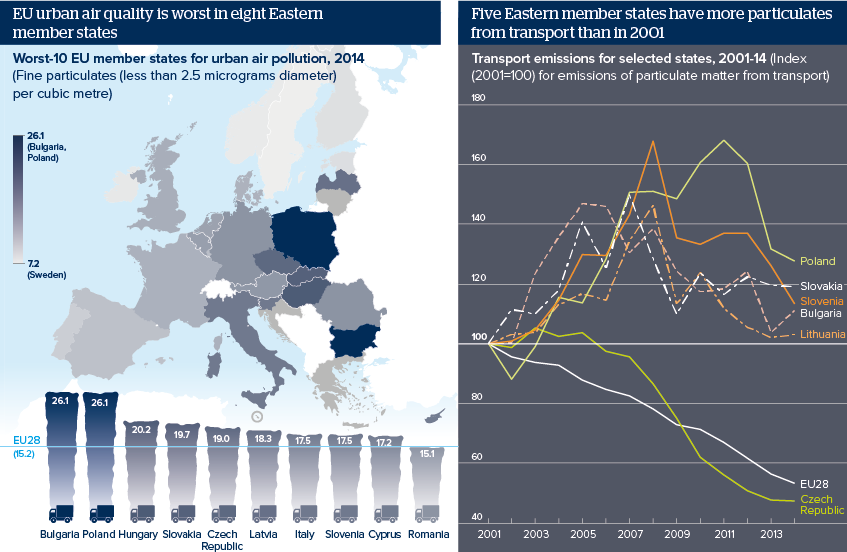EU air quality laggards are all Eastern
Air quality has improved throughout the EU, except in five Eastern member states where it was worse in 2014 than in 2001
Source: European environment agency (EEA), Eurostat
Outlook
Poland’s cities have the most polluted air in the EU, well above the WHO guideline value of 10 micrograms (μg) of fine particulates (smaller than 2.5 μg) per cubic metre. Transport causes most air pollution. In the EU, emissions have mostly been falling since the 1990s, except in some Eastern member states, particularly Bulgaria and Poland. Vehicles tend to be older and dirtier, often bought second-hand from Western Europe; Bulgaria has failed to follow Romania in introducing incentives to scrap cars older than ten years.
Two factors will slow any East European clean-up: stagnating economies will discourage consumer spending choices that are green but costly; environmentalism is not yet the political and social force it is in the West.
Impacts
- Smog in large cities could become serious (and visible) enough for opposition parties to agitate against, as lately in Macedonia.
- Local authorities may turn increasingly to encouraging public transport use and cycling to reduce private car emissions.
- Poorer households may add to particulate pollution by switching to burning wood for heating and cooking.
- Smog, if unaddressed, will cause premature deaths from respiratory problems, cardio-vascular disease and cancers, reducing the workforce.
See also
- Cost-of-living crisis will not hurt Hungary’s rulers - Sep 12, 2022
- More environment funds are opportunity for eastern EU - Jul 18, 2022
- Public health is low priority in Central Europe - Nov 12, 2019
- New Polish party could hold balance of power - Feb 13, 2019
- Air pollution curbs will hurt EU automobile industry - Nov 1, 2018
- Government may gain if it tackles chronic Skopje smog - Dec 29, 2017
- More smogs may force Czechs into political response - Jan 25, 2017
- Paris mayor's diesel ban may inspire other cities - Dec 18, 2014
- More graphic analysis
